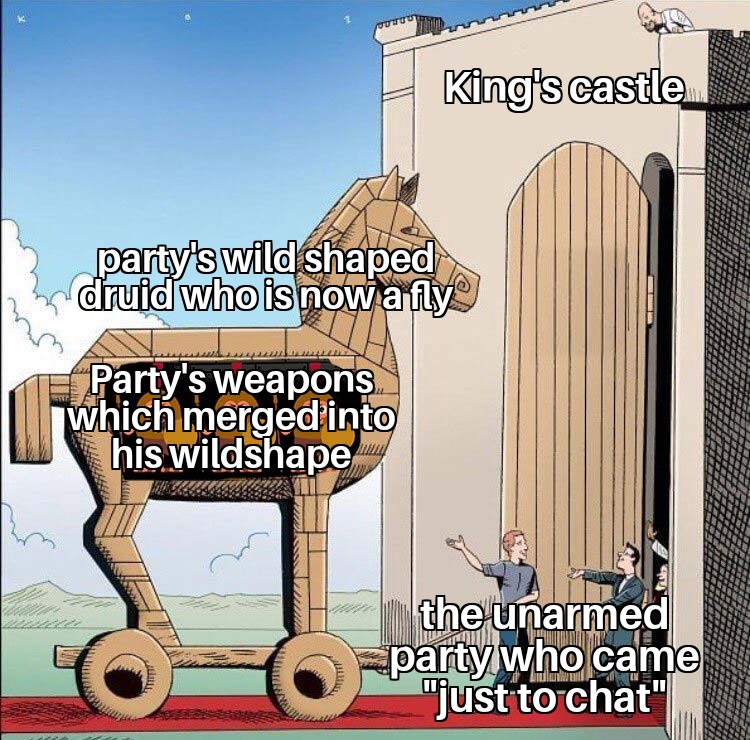this post was submitted on 15 Dec 2023
322 points (97.9% liked)
RPGMemes
12135 readers
658 users here now
Humor, jokes, memes about TTRPGs
founded 2 years ago
MODERATORS
you are viewing a single comment's thread
view the rest of the comments
view the rest of the comments

What would examples of alternative TTRPGs be? And what characteristics would they have that would prevent the "LULZRANDOM We're breaking the system" type of gameplay?
I'm thinking maybe crunchier and more in-depth rules ala Pathfinder or GURPS, since the barrier-to-break is much higher due to having to read more, but I'm just guessing as a relative ttrpg novice here haha
I would instead lean more into the FATE direction. They are more open for interpretation and thus allow the DM more control.
Spells there don't necessarily specify transforming your weapons. The DM would maybe allow it but doesn't have to. Some of those games don't even have a spell list, so no definitive way to know, your spell idea works or even exists (unless you did it before).
This is the first time I have heard of FATE and that is interesting! From what I'm reading, it's highly free-form, with stuff normally associated with characters or the setting being referred to as aspects (like some kind of adjective or attributes of a programming class), which can be called upon to give bonuses provided you have enough fate points). The free-form part comes from the aspects being basically anything related to the characters/setting at hand. I guess it does put a lot of onus on both the DM and the player to collaboratively figure out how to find creative solutions to problems, but in a way that isn't mechanically restricted.
From what I've seen from the suggestions so far, rules-lite/abstract helps to mitigate some of the rube-goldbergy-mad-contraption-tzeentchian-ness that seems to be inherent in rpgs (and probably human nature lol), but not by "restricting" players in a strictly defined box of rules. Rather, rules-lite systems allow for the rube-goldbergy-mad-contraption-tzeentchian-ness to feel less like breaking the system and more like building the system (within reason and the DM's judgment), which is huge. So either that or a heavy narrative focus seems to work well in theory.
I am not here to shit on D&D. If you're having fun, then it's the right game for you and your table.
D&D is a rules medium game that is based around combat, but isn't great at combat being balanced at combat where every PC is basically immortal. The game itself doesn't really set a tone, which makes different people have different expectations of what the game "should" be.
Because of it not-quite-being-great at anything, people tend to want to push limits, or add homebrew.
Edit: A rules lite system with a set tone will also prevent this level of silly, if that's not what you want
Oh don't get me wrong, I play D&D and love it as well haha
I was just curious about other systems and how their approaches to rules, balance, and storytelling affect how players play as well (and DMs DM), seeing as there's a myriad of different systems each with different goals and mechanics. I haven't played any other system on the tabletop, as my group hasn't really tried playing other systems yet (only crpgs based on other systems, plus me reading manuals and rulesets because why not)
I can see how a rules lite system would prevent random pushing of the system until it breaks type of gameplay, ala PbtA games. Plus with more emphasis on crafting a narrative vs focusing on the best combination of stats/skills/interactions, there's less incentive to turn the mechanical knobs until something ends up broken.